Embarking on a journey through the annals of NHL history to uncover and celebrate the top 10 NHL players of all time invites us into a rich narrative filled with unparalleled skill, profound impact, and legendary achievements on the ice. This exploration not only honors the exceptional talents and careers of these athletes but also delves into the essence of what makes hockey a captivating and deeply revered sport across generations.
From the unmatched scoring prowess of Wayne Gretzky to the defensive innovations of Bobby Orr, and from Gordie Howe’s extraordinary longevity to Mario Lemieux’s remarkable resilience, the stories of these players transcend mere statistics to embody the heart and soul of the NHL. Each player’s unique contribution has not only defined their era but has also left an indelible mark on the fabric of the sport, shaping its evolution and enriching its legacy.

This article seeks to weave together the individual narratives of these legends, highlighting not just their on-ice achievements but also their character, their challenges, and the broader impact of their careers on the sport and its fans. In doing so, we aim to offer a comprehensive and engaging portrait of hockey greatness, celebrating the enduring legacy of the NHL’s most iconic figures.
Top 10 NHL Players of All Time
1. Wayne Gretzky – Often referred to as “The Great One,” Wayne Gretzky’s unparalleled scoring ability and hockey sense set him apart as the greatest hockey player of all time.
2. Bobby Orr – Revolutionizing the role of a defenseman with his offensive prowess, Orr’s career, though shortened by injuries, was marked by unprecedented achievements and a transformative impact on the game.
3. Gordie Howe – Known as “Mr. Hockey,” Gordie Howe’s incredible career spanned five decades, showcasing his durability, skill, and competitiveness.
4. Mario Lemieux – “Super Mario” overcame significant health challenges to dominate the ice, combining size, skill, and intelligence in a way few ever have.
5. Maurice Richard – “The Rocket” was the first player to score 50 goals in a season, doing so in just 50 games, and his fierce competitive nature made him a Montreal Canadiens legend.
6. Jean Béliveau – Renowned for his leadership, grace, and scoring ability, Béliveau’s name is etched on the Stanley Cup more times than any other player.
7. Bobby Hull – “The Golden Jet” possessed a lethal slapshot and speed that changed the game, making him one of the most dynamic players to ever lace up skates.
8. Doug Harvey – A defenseman ahead of his time, Harvey’s ability to control the game and his defensive prowess was instrumental in the Montreal Canadiens’ dominance during the 1950s.
9. Terry Sawchuk – With a career that defined resilience, Sawchuk set numerous goaltending records and redefined the position with his style and toughness.
10. Ray Bourque – Bourque’s consistency, durability, and excellence on both ends of the ice make him one of the greatest defensemen in NHL history.
1. The Greatness of Wayne Gretzky
Wayne Gretzky, universally heralded as the greatest hockey player ever, redefined the boundaries of the sport with his incredible vision, intelligence, and scoring ability. Gretzky’s NHL career, spanning from 1979 to 1999, was marked by a litany of records, many of which are considered unbreakable. His staggering total of 2,857 points, comprising 894 goals and 1,963 assists, sits atop the league’s all-time scoring list—a testament to his unparalleled offensive production.
Gretzky’s influence extended beyond the stat sheet; he transformed hockey strategy, emphasizing skill, speed, and anticipation over brute force. His presence elevated the Los Angeles Kings and the sport itself in the United States, contributing significantly to the NHL’s growth. Gretzky’s legacy is not just in his records but in his role in popularizing hockey across North America and inspiring future generations.
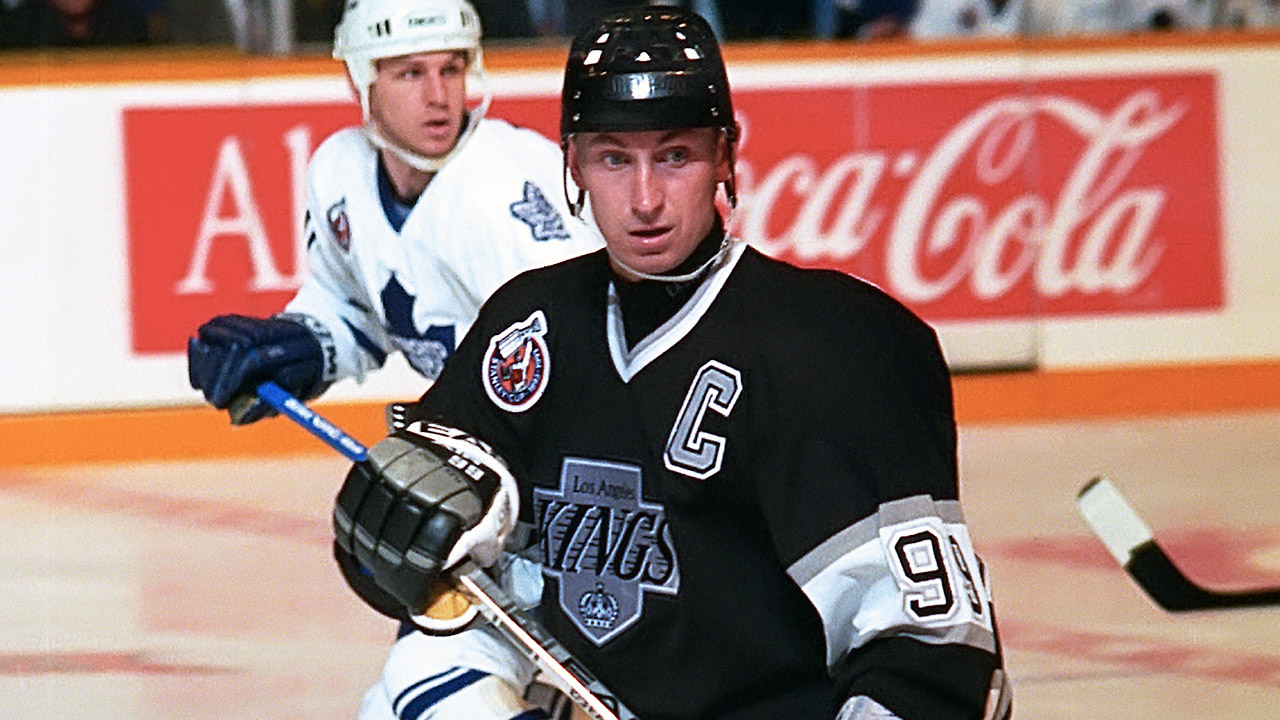
His awards cabinet is as impressive as his on-ice achievements, including four Stanley Cup championships with the Edmonton Oilers, nine Hart Trophies as the league’s most valuable player, and ten Art Ross Trophies as the leading scorer. Gretzky’s number 99 is the only number retired league-wide, a fitting honor for a player who was not just a part of the game’s history but a pivotal figure who shaped its future.

Wayne Gretzky’s impact on hockey is immeasurable, transcending records and championships. He inspired a love for the game in countless fans and players with his extraordinary talent and sportsmanship. Gretzky’s legacy is the epitome of excellence, making him the undisputed greatest NHL player of all time.
2. The Legacy of Bobby Orr: Redefining Defense
Bobby Orr revolutionized the role of the defenseman in hockey, merging defensive responsibility with offensive prowess in a manner that had never been seen before. Playing for the Boston Bruins from 1966 to 1978, Orr’s career, though curtailed by injuries, was packed with moments of brilliance and innovation that have left an indelible mark on the NHL.
Orr’s skating ability was unparalleled. His speed, agility, and ability to control the game’s tempo set him apart. He wasn’t just a player who could defend – Orr was a master at transitioning the puck from defense to offense, effectively becoming the most potent offensive weapon on the ice. His iconic goal to win the 1970 Stanley Cup, where he flew through the air after scoring, encapsulates the essence of his dynamic play.
Statistically, Orr’s achievements are astounding, especially considering his position and era. He remains the only defenseman to have won the league scoring title, doing so twice, and his record for most points in a season by a defenseman (139 during the 1970-71 season) still stands. Orr’s impact is further highlighted by his eight consecutive Norris Trophies as the NHL’s best defenseman, showcasing his dominance during his career.
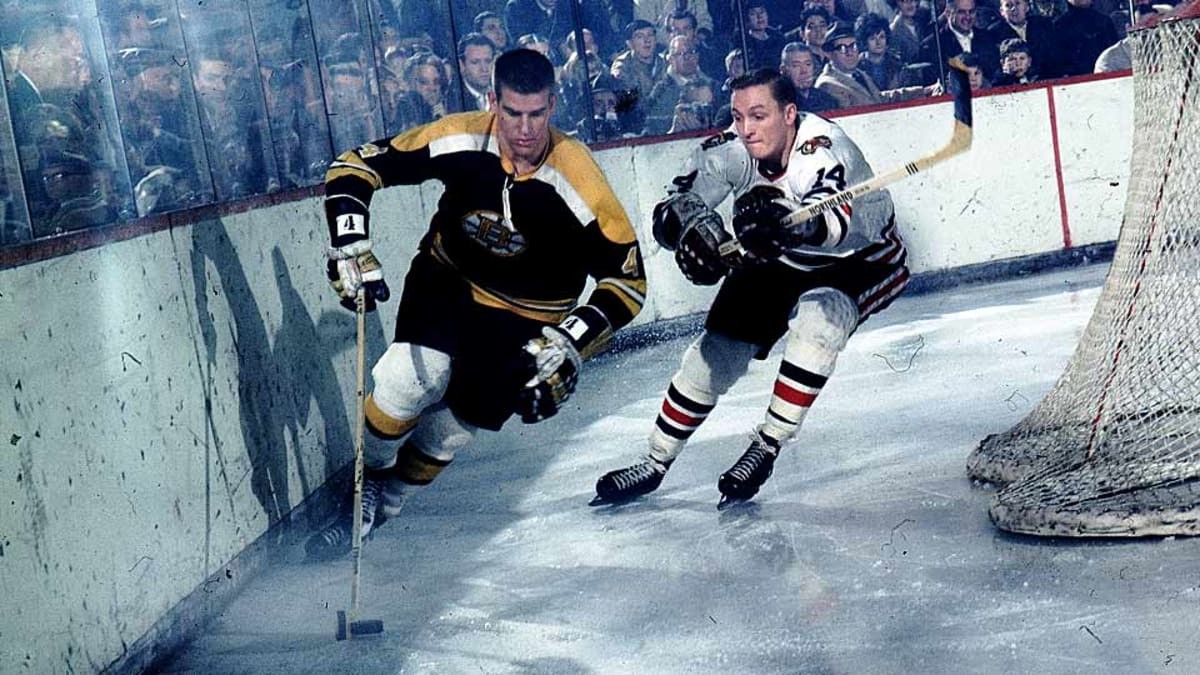
Beyond the numbers, Orr’s influence on the game is profound. He changed how defensemen were viewed, proving they could be as offensive as forwards while still fulfilling their defensive duties. His legacy is seen in the generations of defensemen who followed, players who blend speed, intelligence, and scoring ability, mirroring Orr’s style.
Orr’s career accolades include two Stanley Cup championships with the Bruins, three Hart Trophies as the league’s MVP, and the aforementioned Norris Trophies. His career was unfortunately shortened by knee injuries, yet in his brief time, he achieved a level of greatness that places him firmly among the legends of the game.

Bobby Orr’s contribution to hockey extends beyond his on-ice performance. He inspired young players to view the game differently, to see the potential for innovation and excellence in every position. Orr wasn’t just a player; he was a phenomenon that changed the NHL forever. His number 4 was retired by the Boston Bruins, and his legacy continues to influence the game, making him not just one of the best defensemen but one of the greatest players to ever play the sport.
3. Gordie Howe: The Embodiment of Hockey Longevity and Excellence
Gordie Howe’s legendary career is a testament to unmatched durability, skill, and competitiveness, earning him the moniker “Mr. Hockey.” Howe’s professional journey spanned an astonishing five decades, during which he set the standard for excellence and resilience in the sport. Playing primarily for the Detroit Red Wings, Howe’s career encapsulated not just an era but the evolution of hockey itself.
Howe’s NHL career began in 1946, and he quickly established himself as a dominant force. His playing style combined physical toughness with scoring ability, making him one of the most feared competitors on the ice. Howe’s name became synonymous with a unique blend of skill, strength, and sportsmanship, encapsulated in the term “Gordie Howe hat trick”—a goal, an assist, and a fight in the same game.
Over his career, Howe amassed an incredible 801 goals and 1,850 points in the NHL, records that stood until Wayne Gretzky surpassed them. What makes these figures even more remarkable is Howe’s longevity; he was still playing professionally at the age of 52, a feat unmatched in the sport. His durability and level of play across different eras of hockey highlight his extraordinary athleticism and adaptability.
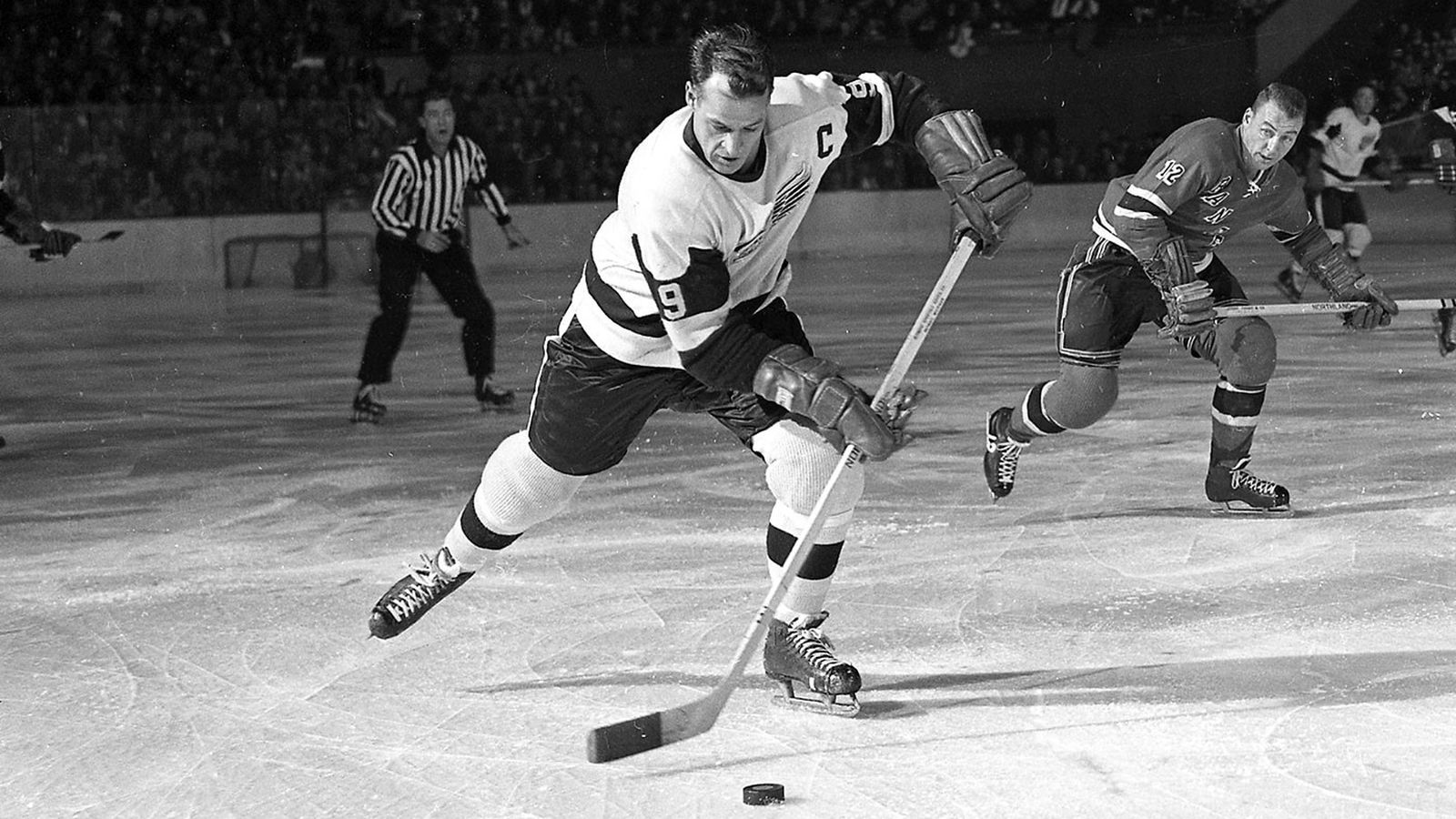
Howe’s impact on the game was profound, both on and off the ice. On the ice, his achievements include four Stanley Cup victories with the Red Wings, six Hart Memorial Trophies as the league’s most valuable player, and six Art Ross Trophies as the leading scorer. Off the ice, Howe was a beloved figure, known for his humility and kindness, contrasting with his fierce competitiveness during games.
The legacy of Gordie Howe is not merely in his statistical achievements but in the indelible mark, he left on the sport of hockey. He was a pioneer, setting standards for future generations and expanding the game’s appeal. His career longevity, combined with his skill set, made him a unique figure in the sport, bridging the gap between the early days of the NHL and the modern era.

Howe’s number 9 was retired by the Red Wings, and he was inducted into the Hockey Hall of Fame in 1972. His influence extends beyond the NHL, with his name gracing trophies and awards that honor sportsmanship and skill. Gordie Howe’s legacy is that of a true icon, a player who embodied the spirit of hockey and whose name will forever be synonymous with greatness in the sport.
4. Mario Lemieux: A Legacy of Overcoming Adversity and Dominating the Ice
Mario Lemieux, affectionately known as “Super Mario,” is a figure whose career is as much a story of triumph over adversity as it is a testament to sheer talent and determination. Playing for the Pittsburgh Penguins from 1984 to 2006, with interruptions due to health issues, Lemieux’s impact on the game and his ability to dominate on the ice, even after battling serious health challenges, cemented his place as one of the NHL’s all-time greats.
Lemieux’s entry into the NHL was marked by immediate success. He scored on his first-ever shot on his first shift, setting the tone for a career filled with remarkable achievements. His combination of size, skill, and intelligence was unparalleled. Lemieux could out-think and out-maneuver his opponents, making plays that others could barely conceive. This unique blend of attributes allowed him to lead the league in scoring six times and secure three Hart Trophies as the league’s most valuable player.
However, it’s the challenges Lemieux overcame that truly define his legacy. His career was plagued by back problems and a battle with Hodgkin’s lymphoma. Despite these obstacles, Lemieux’s resilience and dedication to the sport were on full display as he returned to the ice after every setback, continuing to perform at an elite level. His triumphant return in 1993, after his cancer diagnosis, is one of the most inspiring stories in sports history. Lemieux didn’t just come back; he led the league in scoring, showcasing an incredible display of skill and determination.
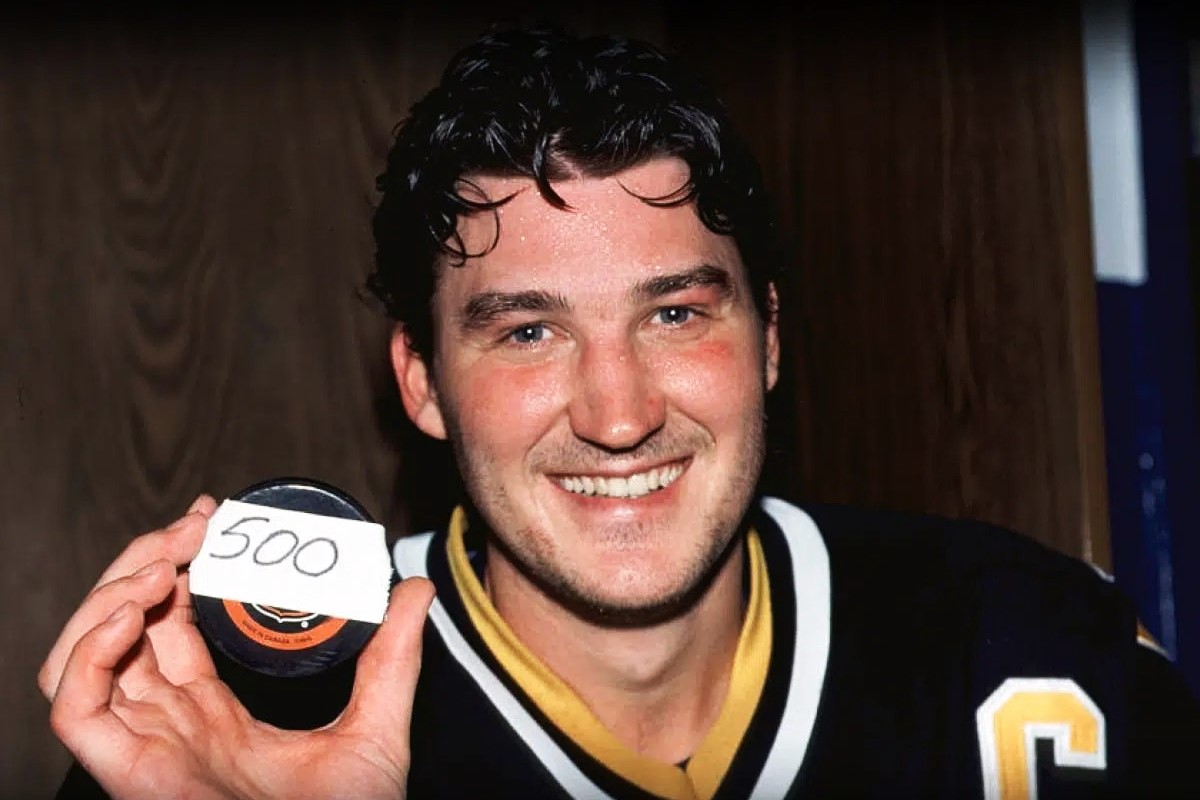
Lemieux’s contributions to the Pittsburgh Penguins were transformative. Under his leadership, the team secured two consecutive Stanley Cup championships in 1991 and 1992. These victories were not just wins for the team but emblematic of Lemieux’s ability to elevate those around him to championship glory.
Beyond his on-ice achievements, Lemieux’s influence extended off the ice. In 1999, facing the possibility of the Penguins’ relocation, Lemieux converted his deferred salary into equity, becoming the principal owner and saving the team from financial distress. This move was unprecedented and highlighted Lemieux’s commitment to the city of Pittsburgh and the sport of hockey.
Mario Lemieux’s career statistics are staggering, with 690 goals and 1,723 points in just 915 games, showcasing his scoring efficiency. But perhaps more impressive is his legacy of perseverance, leadership, and impact on the game. Lemieux’s story is one of a hero who faced down his challenges, on and off the ice, and emerged victorious, inspiring countless fans and players with his courage and skill.

Lemieux’s number 66 was retired by the Penguins, and he was inducted into the Hockey Hall of Fame in 1997. His contributions to hockey are enduring, making him not just one of the greatest players to ever lace up skates but also one of the most inspirational figures in sports history.
5. Maurice “The Rocket” Richard: The Epitome of Passion and Perseverance in Hockey
Maurice Richard, known as “The Rocket” for his explosive speed and scoring ability, is a name that resonates deeply in the annals of NHL history. His career, entirely with the Montreal Canadiens from 1942 to 1960, was marked by groundbreaking achievements and an indomitable spirit that made him a hero not just in Montreal but across Canada and the hockey world.
Richard’s impact on the game was immediate and profound. He became the first player in NHL history to score 50 goals in a season, achieving this milestone in just 50 games during the 1944-45 season. This feat, remarkable in its own right, was a harbinger of the scoring prowess Richard would exhibit throughout his career. He was a natural goal scorer, with an uncanny ability to find the back of the net in critical moments, earning him the reputation as one of the most clutch performers in the sport’s history.
But Richard’s legacy is not defined by his scoring records alone. He played with a fiery passion and intensity that made him a formidable competitor. His fierce determination and will to win were evident in every shift he took on the ice. This intensity sometimes boiled over, as seen in the infamous Richard Riot of 1955, an event that underscored his significance to his fans and the deep emotional connection he had with the people of Quebec.
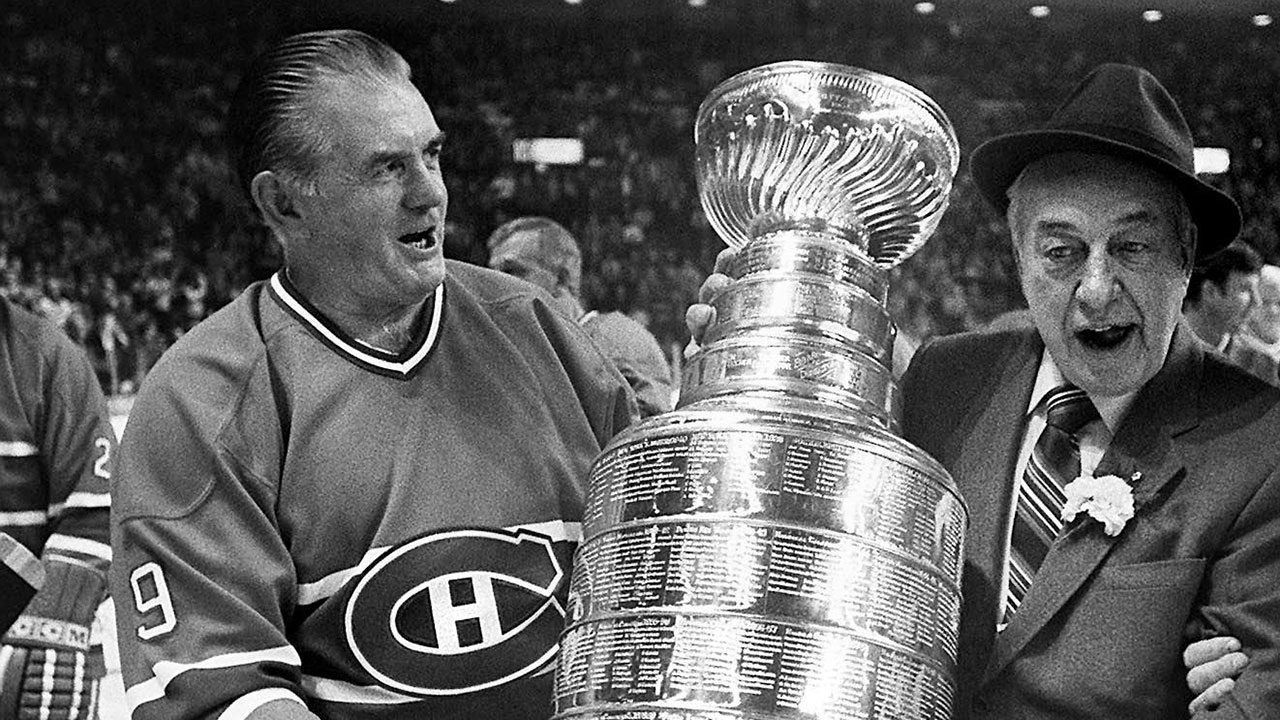
Richard’s career was laden with accolades, including eight Stanley Cup victories, indicating his leadership and the pivotal role he played in one of the most dominant dynasties in hockey history. Despite facing numerous challenges, including injuries and the tumultuous relationship with NHL officials, Richard’s resolve never wavered. His resilience in the face of adversity inspired his teammates and fans alike.
Off the ice, Richard was a symbol of Quebecois pride and cultural identity. In a period marked by cultural and linguistic tensions in Canada, Richard emerged as a unifying figure, celebrated for his achievements and revered for his humble demeanor and integrity. His legacy transcends sports, embodying the spirit of perseverance and excellence.
Maurice Richard’s career statistics are impressive, with 544 goals and 421 assists in 978 games, but they only tell part of the story. His influence on the game, his team, and his community was immeasurable. Richard was not just a hockey player; he was a cultural icon whose impact was felt far beyond the rink.
Upon his retirement, Richard’s number 9 was retired by the Canadiens, and he was inducted into the Hockey Hall of Fame in 1961. The NHL’s annual award for the league’s top goal scorer is named in his honor, a fitting tribute to one of the greatest goal scorers in the history of the sport.

Maurice “The Rocket” Richard’s legacy is a testament to the power of passion and perseverance. He was a player who not only changed the game but also left an indelible mark on society, embodying the qualities of determination, excellence, and cultural pride.
6. Jean Béliveau: A Legacy of Grace, Leadership, and Excellence on Ice
Jean Béliveau, whose career spanned from 1950 to 1971, all with the Montreal Canadiens, is revered not just for his impeccable skill and achievements on the ice but also for his exemplary character and leadership off it. Béliveau’s name is synonymous with hockey excellence, a testament to his significant contributions to the sport and his indelible impact on the NHL and the Canadiens’ storied history.
On the ice, Béliveau’s elegance was unmatched. He possessed a rare combination of size, skill, and intelligence that made him a dominant force and a perennial threat to opposing teams. Béliveau’s playmaking ability, coupled with his scoring touch, made him one of the most complete players of his era. He was instrumental in leading the Canadiens to an astonishing ten Stanley Cup victories, a record for a player at the time of his retirement.
Béliveau’s accolades include the Hart Trophy as the league’s most valuable player twice and the Art Ross Trophy as the league’s leading scorer. However, his contributions cannot be measured by statistics and awards alone. Béliveau’s leadership qualities were unparalleled; he served as the Canadiens’ captain for ten seasons, during which his calm demeanor, respect for the game, and innate ability to inspire his teammates set him apart as one of the greatest leaders in sports history.
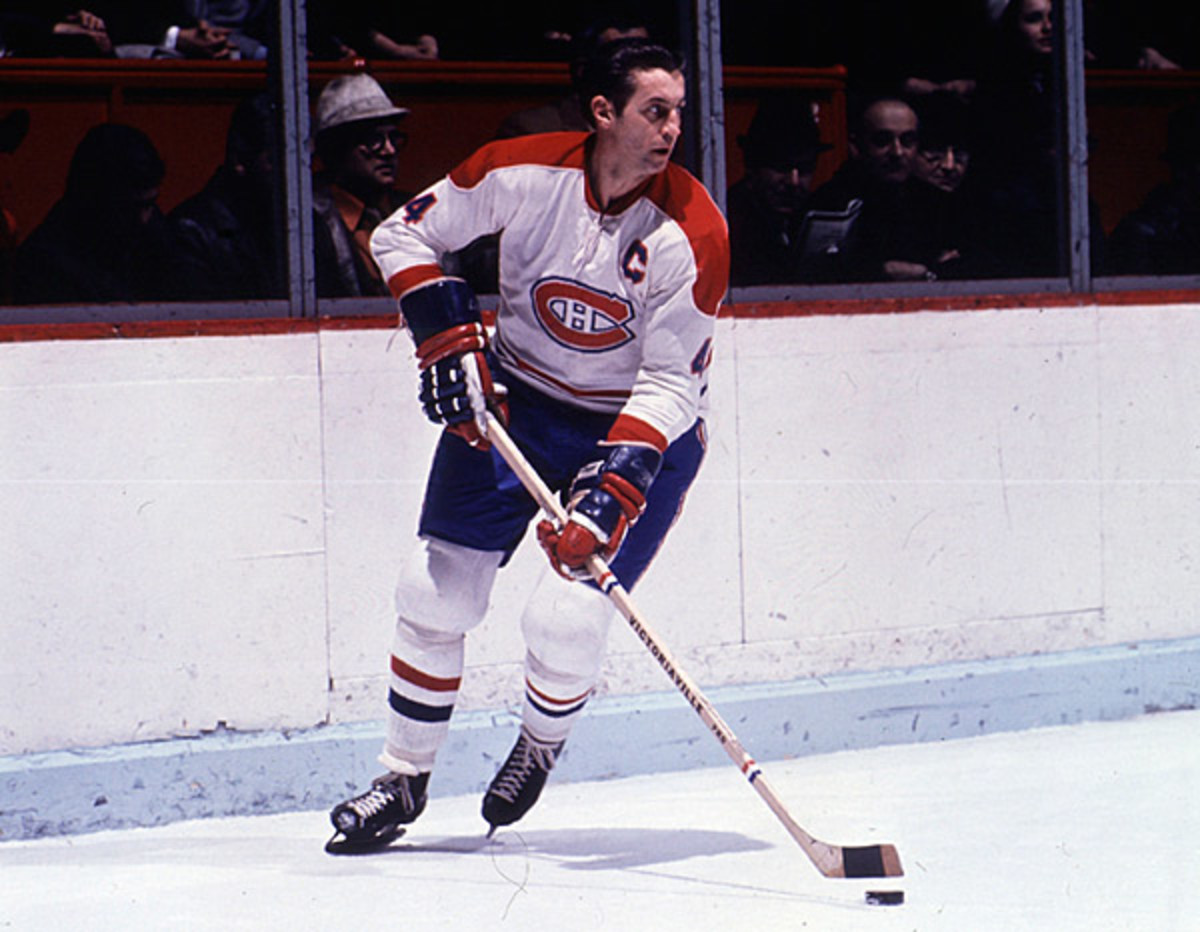
Off the ice, Béliveau was equally impactful. He was known for his philanthropy, humility, and integrity, embodying the values of respect and sportsmanship. Béliveau’s grace and dignity in handling fame, along with his commitment to community service, made him a role model not only for hockey players but for athletes across all sports. His legacy extends beyond his physical presence on the ice, influencing countless individuals with his character and contributions to society.
Following his retirement, Béliveau’s contributions were recognized with numerous honors, including induction into the Hockey Hall of Fame in 1972. The Canadiens retired his number 4 jersey, and the NHL introduced the Jean Béliveau Trophy, awarded to the player who best exemplifies leadership qualities on and off the ice.
Jean Béliveau’s career stats are impressive, with 507 goals and 712 assists in 1,125 regular-season games, but they only scratch the surface of his influence. His leadership, grace, and commitment to excellence set a standard for what it means to be a professional athlete. Béliveau’s legacy is not just in the records he set or the championships he won but in the lives he touched and the example he set for future generations.

In a sport as dynamic and competitive as hockey, Jean Béliveau’s legacy is a beacon of what it means to achieve greatness with humility and grace. He remains an enduring symbol of excellence in hockey and a reminder of the profound impact an athlete can have on their sport and community.
7. Bobby Hull: The Golden Jet’s Trailblazing Impact on Hockey
Bobby Hull, nicknamed “The Golden Jet” for his blonde hair and blazing speed, redefined what it meant to be a winger in the National Hockey League (NHL) and the World Hockey Association (WHA). Playing primarily for the Chicago Blackhawks during the 1950s, 60s, and early 70s, Hull’s combination of speed, shot power, and scoring ability made him one of the most dynamic and influential players of his era.
Hull’s impact on the game was immediate and profound. His unparalleled slapshot, often clocked at over 100 miles per hour, became his signature move, leaving goaltenders and defenders in awe. This remarkable skill, combined with his incredible speed and agility, allowed Hull to dominate games, leading to an impressive career that included scoring more than 50 goals in a season multiple times, a feat that was almost unheard of before his arrival.
Beyond his achievements, Hull’s style of play helped transform hockey. He was a key figure in shifting the game towards a faster, more offensively driven spectacle, influencing the strategies employed by teams and the development of players for generations to come. Hull’s legacy includes leading the Blackhawks to a Stanley Cup victory in 1961, the team’s first in 23 years, cementing his status as a Chicago sports legend.
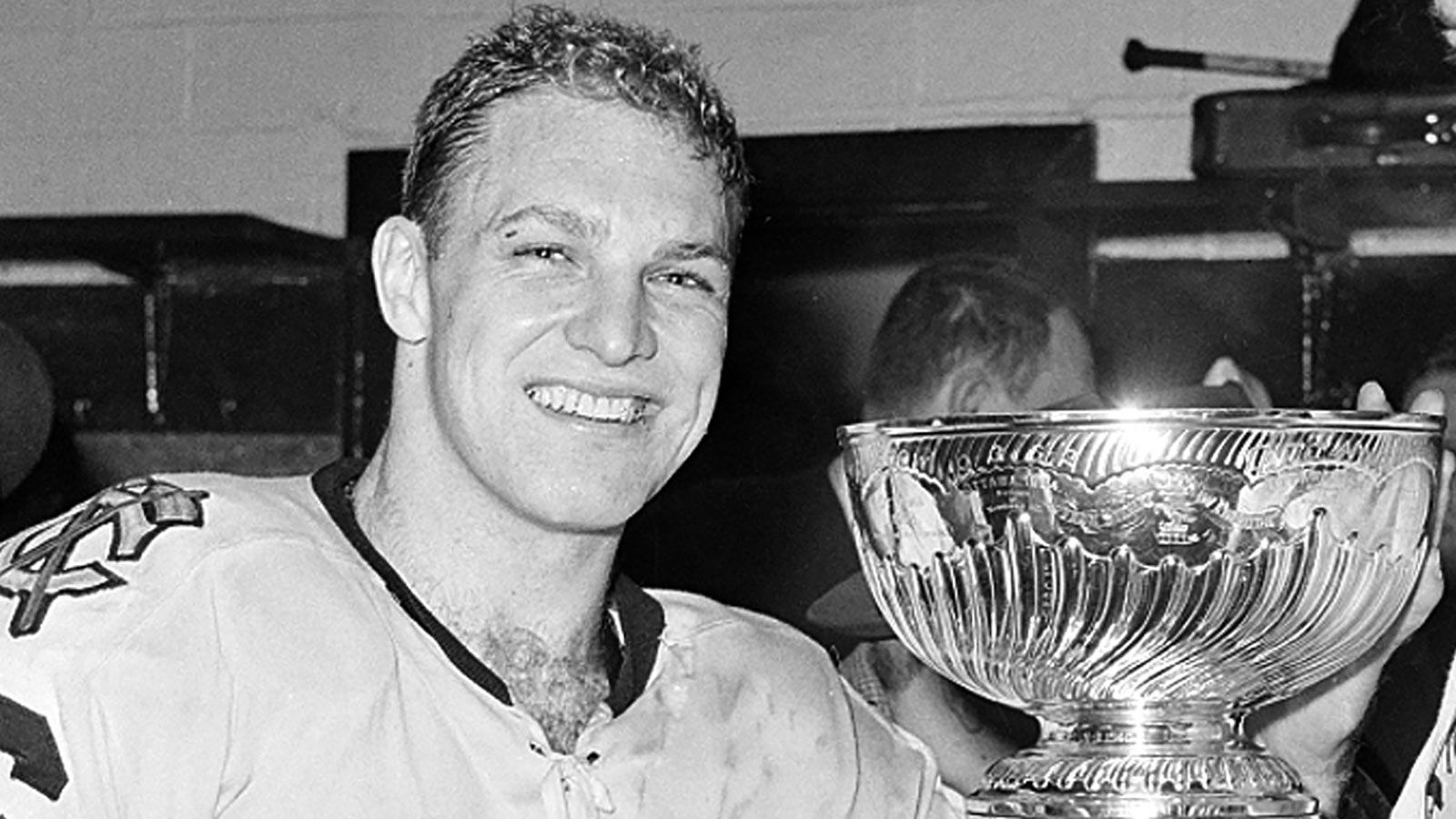
Hull’s influence extended beyond the NHL when he signed with the Winnipeg Jets of the WHA in 1972, a move that challenged the NHL’s dominance and contributed to significant changes in player salaries and the business of hockey. His transition to the WHA was pivotal, highlighting the league as a legitimate competitor to the NHL and leading to the eventual merger of the two, which brought about a more unified and competitive professional hockey landscape.
Throughout his career, Hull was recognized with numerous awards, including two Hart Memorial Trophies as the NHL’s most valuable player and the Art Ross Trophy as the league’s leading scorer. His accolades, however, only partially capture the essence of his contribution to the sport. Hull’s electrifying play and charismatic personality made him a fan favorite and a pivotal figure in popularizing hockey across North America.
Hull’s statistics are impressive, with 610 goals and 560 assists in the NHL, and additional accolades in the WHA, but his legacy is not merely in the numbers. It’s in the excitement he brought to the ice, the way he captivated audiences, and how he pushed the boundaries of what was possible in hockey.
Bobby Hull’s number 9 was retired by the Blackhawks, and he was inducted into the Hockey Hall of Fame in 1983. His influence on the game is still felt today, as players and fans alike look back on his career as a source of inspiration and a benchmark for excellence in the sport.

Bobby Hull’s story is one of innovation, excellence, and transformation, making him not just a hockey legend but a pioneer whose contributions helped shape the modern era of the game.
8. Doug Harvey: Mastering the Blue Line and Transforming Defense Play
Doug Harvey stands as one of the most influential figures in the history of hockey, particularly in the way the game is played from the defensive perspective. Throughout his illustrious career, primarily with the Montreal Canadiens during the 1950s and early 1960s, Harvey not only set the standard for what it meant to be a defenseman but also revolutionized the position, influencing generations of players who followed in his footsteps.
Harvey’s approach to the game was characterized by his exceptional hockey IQ, superb skating ability, and unparalleled vision on the ice. Unlike many defensemen of his era, who primarily focused on physical play and clearing the puck, Harvey saw opportunities to contribute offensively and control the game’s pace. His ability to read the play, make precise passes, and support his team’s offensive efforts without neglecting his defensive duties marked a significant shift in how the defenseman’s role was perceived.
Harvey’s impact on the Canadiens and the NHL was profound. He was instrumental in Montreal’s dominance during the 1950s, helping the team secure six Stanley Cup victories. His contributions were recognized with numerous accolades, including winning the James Norris Memorial Trophy as the NHL’s best defenseman seven times, a record that stood for decades.
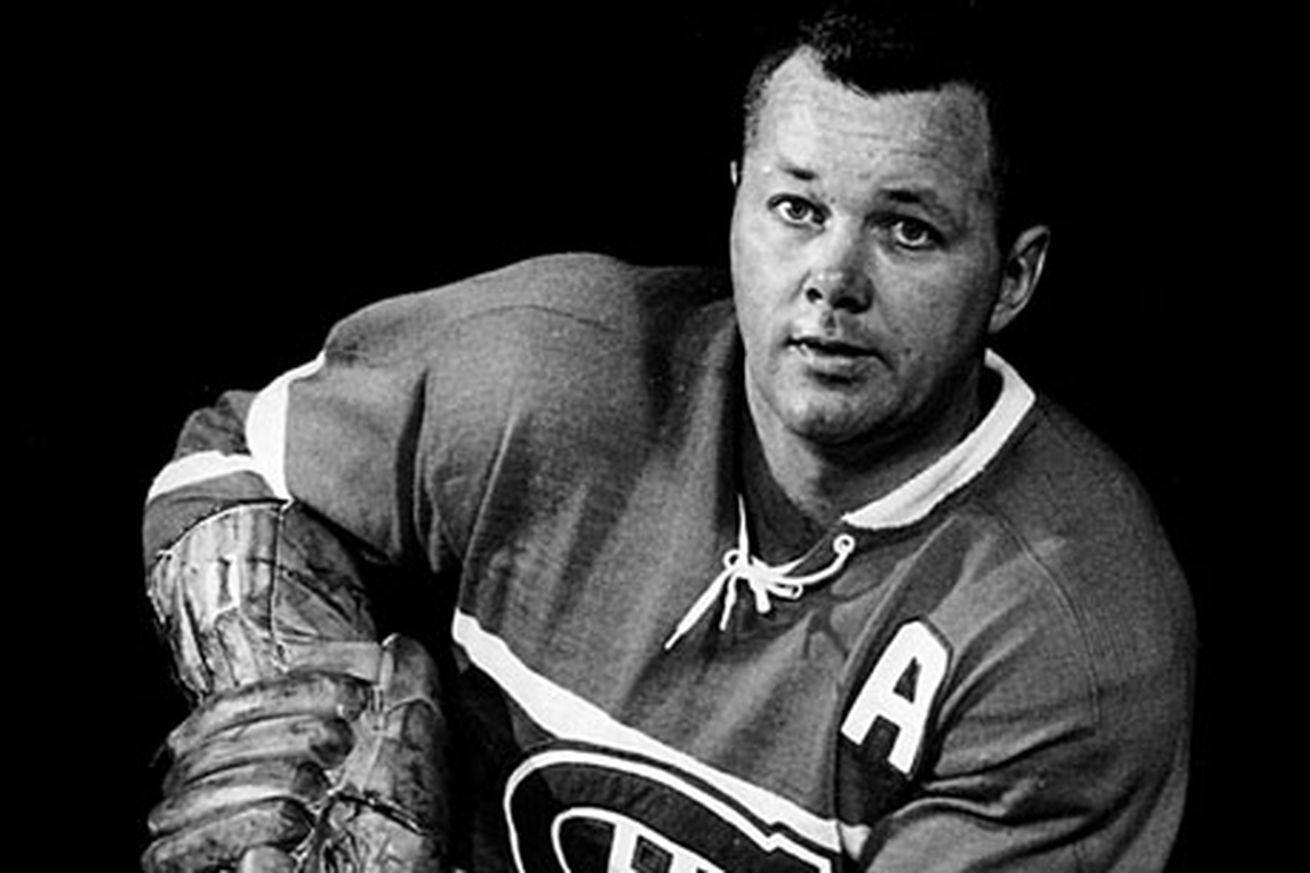
Beyond his contributions on the ice, Harvey’s influence extended to how the game was played strategically. He was a key figure in popularizing the use of the defenseman in a more dynamic role, participating in the rush, and contributing to the team’s offensive plays. This strategy not only changed how defensemen were used but also added a new layer of complexity to the game, making it more strategic and multi-dimensional.
Harvey was also known for his leadership and sportsmanship. Despite his competitive nature, he was respected by teammates and opponents alike for his fair play and dedication to the sport. His advocacy for players’ rights and involvement in the early efforts to establish a players’ association highlighted his commitment to improving the conditions for his peers, further cementing his legacy as a player who made a significant impact both on and off the ice.
Upon retiring, Doug Harvey left behind a legacy that transcended his impressive statistics and accolades. His visionary approach to playing defense changed the NHL, paving the way for future generations to explore and expand the role of defensemen in hockey. His induction into the Hockey Hall of Fame in 1973 was a fitting tribute to a player whose contributions to the game were immeasurable.

Doug Harvey’s number 2 jersey was retired by the Canadiens, a testament to his enduring impact on the franchise and the sport as a whole. Today, he is remembered not just as one of the greatest defensemen to ever play the game but as an innovator who forever altered the landscape of hockey.
9. Terry Sawchuk: The Indomitable Spirit Behind the Mask
Terry Sawchuk’s name is etched in the annals of NHL history as one of the most formidable goaltenders ever to guard the net. His career, spanning the late 1940s to the early 1970s, is a testament to resilience, skill, and a relentless pursuit of excellence in one of the sport’s most challenging positions. Sawchuk’s journey through the NHL, with significant stints at the Detroit Red Wings and Toronto Maple Leafs, among others, showcases a legacy defined by groundbreaking achievements and the enduring impact of his contributions to goaltending.
Sawchuk’s approach to the game combined incredible agility, sharp reflexes, and an intuitive sense of anticipating the opponent’s moves. His style of play revolutionized goaltending, setting new standards for technique and athleticism. Sawchuk was not just a barrier to the goal but an active participant in the game, using his stick and pads not only to block shots but to control rebounds and assist in setting up plays.
The physical toll of Sawchuk’s playing style was immense. Goalies of his era did not wear the same level of protective equipment as modern players, and Sawchuk’s body bore the brunt of his dedication to stopping the puck. Despite suffering numerous injuries throughout his career, his commitment never wavered. Sawchuk’s resilience in the face of physical adversity was inspirational, demonstrating unparalleled toughness and dedication to his team and the game.
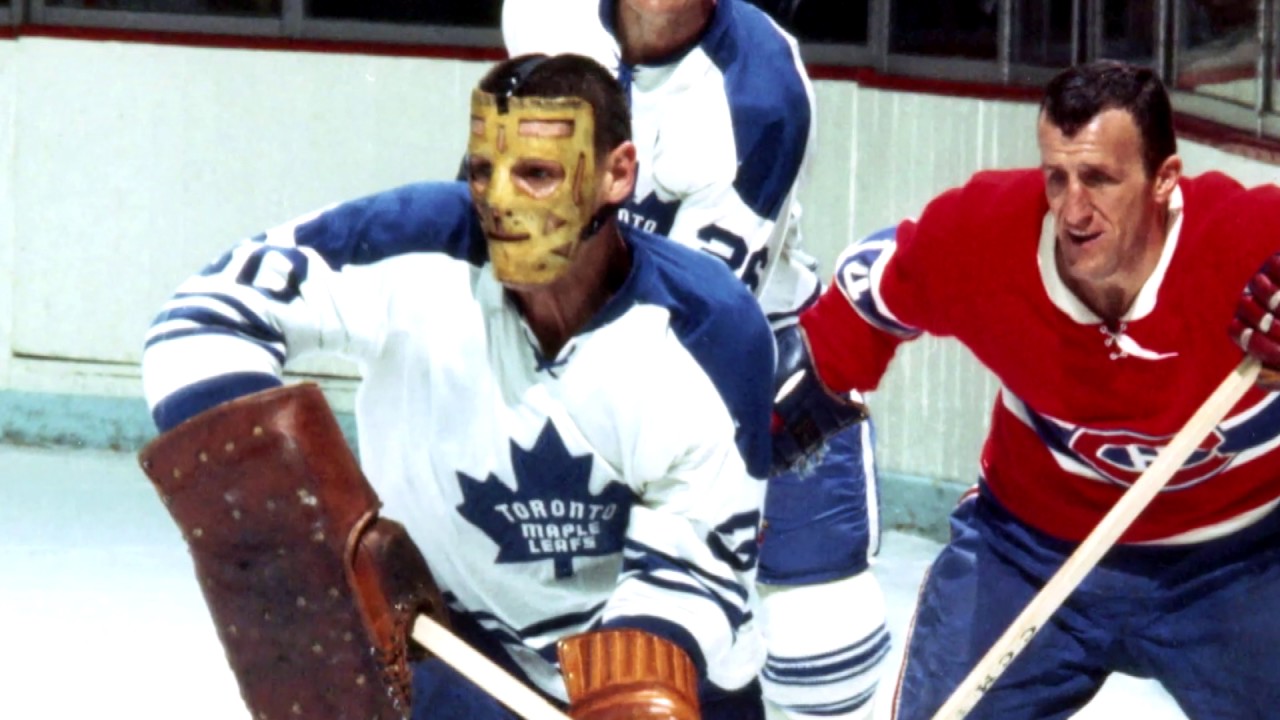
Sawchuk’s career is decorated with numerous accolades that highlight his skill and impact on the NHL. He won the Vezina Trophy, awarded to the league’s best goaltender, four times and was a key player in four Stanley Cup victories. His record of 103 shutouts stood for decades, a testament to his skill and consistency between the pipes.
Beyond the statistics and awards, Sawchuk’s legacy is one of transformation. He was a pioneer in goaltending, employing techniques that would become foundational to the position. His playing style influenced generations of goaltenders, laying the groundwork for the modern game’s emphasis on athleticism and technical skill in netminding.
Sawchuk’s contribution to hockey extended beyond his on-ice performance. His dedication and perseverance in the face of adversity inspired teammates and fans alike, embodying the spirit of determination and resilience. Despite the challenges he faced, including personal struggles, Sawchuk’s legacy as a competitor and a team player remains undiminished.
Following his untimely death in 1970, Sawchuk was inducted into the Hockey Hall of Fame in 1971, a fitting tribute to his remarkable career and contributions to the sport. His legacy is not just in the records he set or the games he won but in the way he played the game — with courage, innovation, and an indomitable spirit.

Terry Sawchuk’s story is a poignant reminder of the physical and emotional demands of professional hockey, showcasing the depth of character and commitment required to excel at the highest level. His legacy continues to inspire future generations, standing as a benchmark of excellence in goaltending and sportsmanship in the NHL.
10. Ray Bourque: The Quintessence of Defensive Mastery and Longevity
Ray Bourque, whose career spanned over two decades predominantly with the Boston Bruins before concluding with the Colorado Avalanche, epitomizes the pinnacle of defensive skill and resilience in the National Hockey League (NHL). Bourque’s tenure in the league is a testament to his unwavering dedication, elite performance, and the transformative impact he had on the defenseman role.
Bourque’s entry into the NHL in 1979 was marked by immediate recognition of his potential, which quickly materialized into dominant performances that redefined the expectations for a defenseman. His unique blend of offensive capabilities and defensive acumen allowed him to control the game’s flow, contributing significantly on both ends of the ice. Bourque’s prowess was not limited to his exceptional passing and puck-handling skills; his strategic shot from the point became a critical component of his team’s offensive strategy, often leading to scoring opportunities and goals.
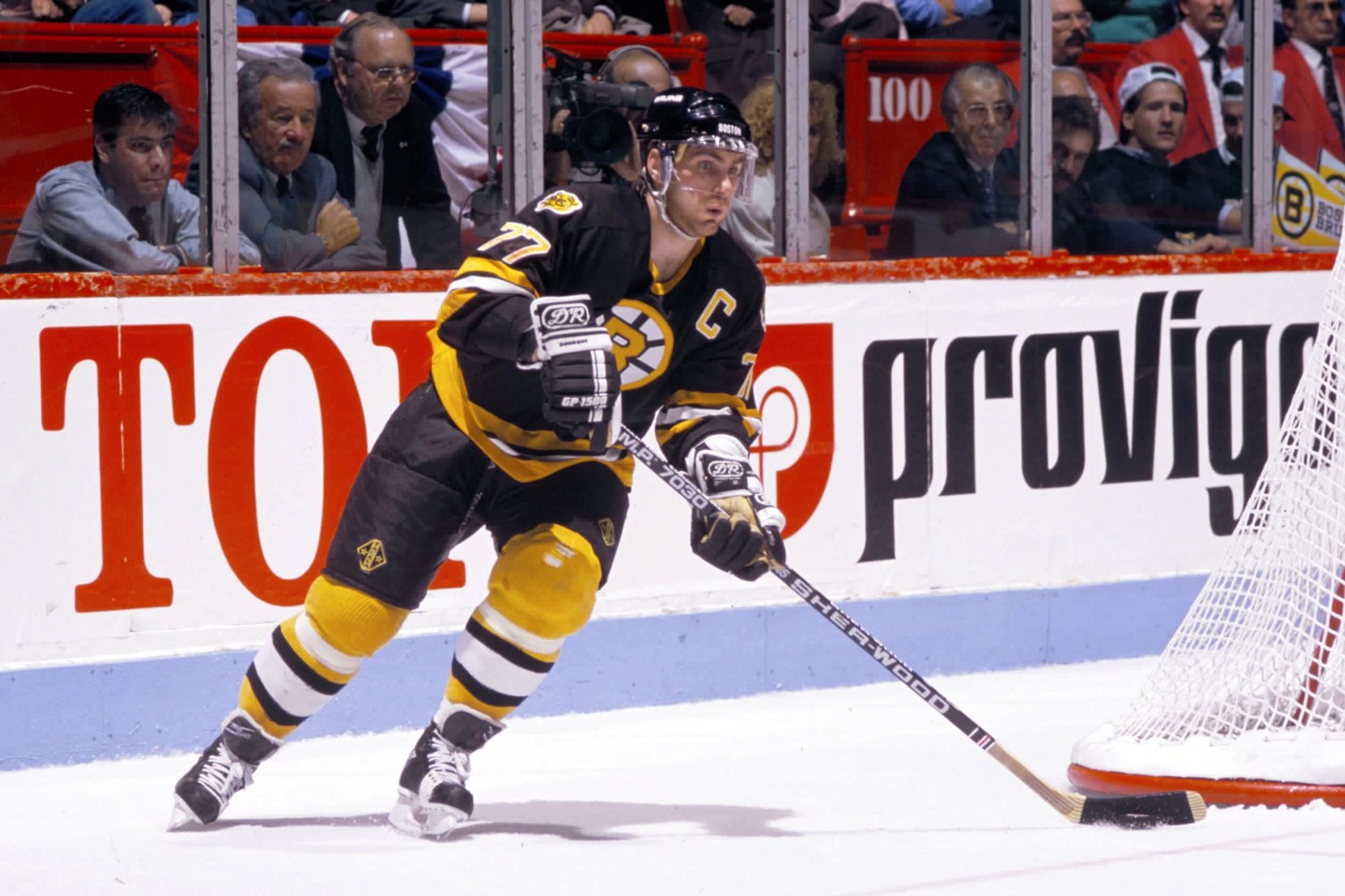
Throughout his career, Bourque accumulated a staggering array of personal accolades that reflect his dominance on the ice. He won the Norris Trophy as the league’s top defenseman five times, a testament to his consistent excellence and impact on the game. Moreover, his offensive contributions were equally impressive, as evidenced by his status as the all-time leader in goals, assists, and points by a defenseman, milestones that underscore his unparalleled ability to influence the game’s outcome from the defensive position.
Bourque’s leadership and character were equally influential in shaping his legacy. As the captain of the Bruins for over a decade, he exemplified leadership through his work ethic, professionalism, and commitment to excellence. His determination to win and dedication to the sport was ultimately rewarded when he captured his first and only Stanley Cup with the Colorado Avalanche in 2001, a moment that remains one of the most iconic in NHL history.
Off the ice, Bourque’s contributions to the community and his engagement with fans solidified his reputation as a role model and ambassador for the sport. His humility, respect for the game, and generosity further endeared him to fans and colleagues alike, enhancing the legacy he leaves behind.

Upon retiring, Bourque’s impact on the sport was immediately recognized with his induction into the Hockey Hall of Fame in 2004. The Boston Bruins and Colorado Avalanche have both honored Bourque by retiring his number, ensuring that his contributions to the teams and the sport will be remembered forever.
Ray Bourque’s career stands as a monument to the ideals of perseverance, excellence, and leadership in the realm of professional hockey. His journey from a promising rookie to one of the game’s most respected figures is a narrative that inspires both current players and fans, encapsulating the essence of dedication and the pursuit of greatness within the NHL.
In conclusion,
the exploration through the careers of the top 10 NHL players of all time offers a panoramic view of hockey’s rich history and the monumental impact these athletes have had on the sport. From Wayne Gretzky’s unparalleled scoring records to Bobby Orr’s revolutionary play as a defenseman, and from Gordie Howe’s incredible longevity to Mario Lemieux’s inspiring battles against adversity, each player has contributed uniquely and indelibly to the fabric of hockey.
Maurice Richard’s fiery passion, Jean Béliveau’s exemplary leadership, Bobby Hull’s blistering speed and shot, Doug Harvey’s defensive artistry, Terry Sawchuk’s goaltending brilliance, and Ray Bourque’s all-around excellence and durability together represent the pinnacle of achievement in the NHL. Their careers span decades, and their legacies, each distinct, have collectively elevated the game, inspired countless players and fans, and set standards that today’s NHL continues to aspire to.
Beyond their individual accolades and statistical achievements, these legends have shaped the culture of hockey, influenced the development of the sport, and left an enduring impact that transcends generations. Their stories are not just of personal triumph and talent but also of the evolution of hockey itself—from the style of play and strategic approaches to the professionalization and global reach of the sport.









